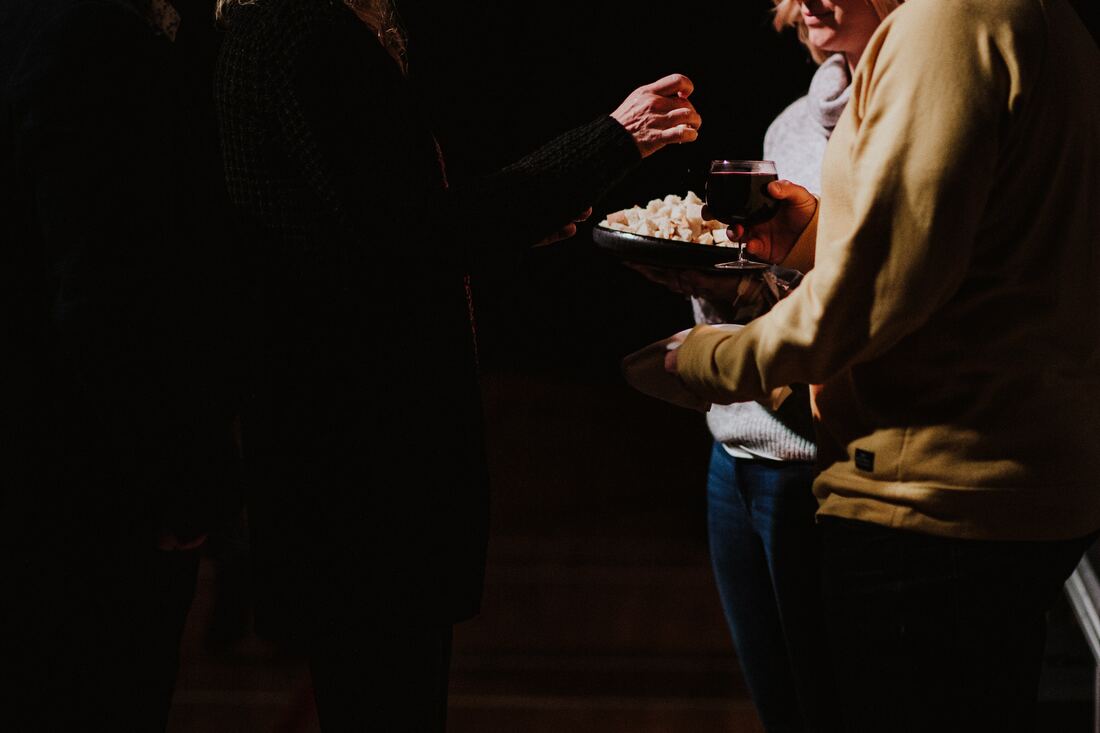|
A couple of years ago, my wife invited me to go to the public library with her and our boys. I wasn’t going to go, but then I thought why not. I ended up walking around the library searching for something interesting. A small audiobook on disc with a bright yellow cover caught my eye. It was a book I hadn’t heard about. It was titled, God of the Underdogs. I picked it up believing that it was going to be just another book with little to no consequence. At the same time, our family was in the middle of a season of transition not knowing what our ‘next’ was or where our ‘next’ would be. We were in a holding pattern. Reading the contents of this particular book changed the course of our lives. The words that Matt Keller, the author, wrote in this book felt like they were written just for me in that particular season. There was a moment when I was driving to a meeting and literally had to pull the car over and “rewind” the disc so I could hear it again. After processing this book, Heather and I decided to change the course of action we were currently on. I can’t put everything into words, but I can honestly say that without the invitation to visit the library, I might not have ever come across this book. Without listening to that particular audiobook, I don’t know if I would have ever considered starting a church. These kinds of events happen all the time... blind dates, swiping right or a guy asking a girl out finally after having a major crush on her. These decisions can change the course of history. The seemingly simple act of inviting a friend to go on a run could start them down the path of becoming a marathon runner. This marathon runner could raise kids who not only watch their mom run marathons but want to be physically active as well. This could change the course of their family’s medical history of unhealthy patterns and habits and end obesity and heart attacks in their family tree. Taking the unseemingly small step and asking a co-worker to watch a big game with you in March might result in you guys becoming best friends. This could result in a lifelong family friendship that last decades and even generations. Inviting someone to something can change the course and trajectory of their life. What would happen if we lived our lives thinking this through? What could happen if we believed that we might actually improve someone’s life? What risks would we be willing to take? I believe that deep down every human being wants to do good and wants to help others improve. Inviting someone to encounter Jesus in an authentic way is the most important invitation someone can make. We may think it’s simple to invite a co-worker, friend, neighbor or family member to attend a church service, but that could change the trajectory of their life and their family for generations to come. So how should we do it? Should we just walk around and invite everyone and anyone? That’s an option, but I don’t believe it’s the best option. Here are three simple steps that we follow here at RE.THINK Church when inviting someone to attend a service here at RE.THINK. 1. Pray. We Pray that God will bring at least three people or three families to our mind that don’t have a relationship with Jesus yet. We truly believe that inviting someone to church could change their lives and the trajectory of their family. We know that God loves each person more than we do. We believe He longs to have a relationship with each person He created, therefore, we ask God to help. 2. Invest. Just like good wine, pairing matters. Invite cards pair well with gifts, notes of encouragement, kind words etc. Take some time and invest in someone’s life. 3. Invite. Take the courageous step and invite someone to join you at RE.THINK Church. Taking this courageous step literally could change their life. Let’s change the course of history by grasping one of the most powerful forces, the force of potential. The power of the invitation holds so much potential! Photo by Jessica Ruscello on Unsplash
0 Comments
At RE.THINK Church, we start with the Bible in order to determine what is true, right and accurate. If the Bible isn’t clear about a topic, we’ll see what church leaders throughout history have said. We move to logic and then our own personal experiences from there in order to determine what is true, right and accurate. With that in mind, we acknowledge there are several faith traditions that have different opinions about what communion is and what it isn’t. The Bible is our foundation for understanding this sacred meal. We want to be clear and help people understand communion.
We must acknowledge that Jesus was a Jewish man who practiced Judaism. One of the central events and practices of Judaism is Passover. This reminds the Jewish people that God freed them from slavery in Egypt (Exodus 1-13). Jesus gathered with his apostles in an upper room in Jerusalem to celebrate Passover. The Passover Meal included a plate called a Seder plate that held very symbolic objects and meaning. The meal also involved 4 cups of wine each having their own symbolic meaning. For a more in depth explanation of the Seder Plate click here. During a Passover celebration with his apostles Jesus issued in a new meal with a new meaning and a new purpose. See Matthew 26: 26-30, Mark 14, Luke 22 and John 13. Jesus’ sacrifice to pay for humanity’s sin was just around corner. During this familiar meal, Jesus spoke to his apostles. He took the bread and blessed it and broke it while saying “This is my body which is given for you”. He also took a cup of wine and said “This is my blood which is poured out as an offering for the forgiveness of sins”. Jesus gave his followers instructions during this meal, First Jesus said, “Do this and when you do this, remember me and what I’m about to do”. Second, Jesus gave a new command, “Love one another”. As one can imagine, this meal became a tradition whenever the people of the church gathered. In some places, it became an issue. So, leaders in the church’s early days had to give instructions and reminders. The church in Corinth was one that had some issues. Their leader, Paul, wrote a letter to them to further the instructions and bring clarity. We encourage you to read 1 Corinthians 11 on your own some time soon. We want to point out one of the instructions Paul wrote about to the church in Corinth. Paul gives some of these instructions in I Corinthians 11:27-32. The instructions may seem a bit harsh, but they were meant to bring reverence back to the meal. Literally, people were getting drunk off of the communion wine. They were also just going through the motions when it came to communion. Paul’s instructions help us to evaluate ourselves and make sure that we are not just going through the motions or abusing the meal’s intention. What is communion?
We hope this helps you understand this sacred practice followers of Jesus have participated in for centuries. RE.THINK Church celebrates communion periodically throughout the year. For this installment of the miniseries we are going to link to Justin at That Christian Vlogger's Youtube channel.
Justin Khoe is a digital missionary. Known online primarily as, “That Christian Vlogger,” his Youtube videos have been seen around the world by over a million people. With over ten years of preaching, literature evangelism, and teaching experience under his belt, Justin’s current focus is to leverage social media to help reach unchurched young adults. Cohosting the show with him is his wife, Emily. Justin and Emily aim to equip young adults to have a stronger and deeper relationship with God and to help them discover who God has created them to be. They call this way of living, “experiencing faith in the first person.” You might not know this, but I am a record holder. To my knowledge, this record has stood the test of time for almost three decades. I’d say that’s pretty good! What is this record you might ask? I have made more Sunday School teachers quit after teaching me on Sunday mornings from Plymouth Wesleyan Church (the church my family and I attended while growing up). Most pastors probably wouldn’t be proud of this, but I am if I’m honest.
I’m sure there were many reasons as to why those amazing volunteers, who sacrificially and generously gave of their time and energy to teach me the basics of the Bible, decided to quit. One particular teacher told me that I asked too many questions about the Bible, especially when I discovered the books of Songs of Solomon and Ezekiel. Those are some pretty graphic books. I would read those newly discovered passages loudly and proudly wondering why the author of Songs of Solomon talked about a ladies breasts being like the fawns of a gazelle. I’d ask the teacher what fawns of a gazelle look like and if they really compared to breasts. All joking aside, no one really ever explained to me, in a way I could understand, WHY and HOW I should read the Bible so that it would add value to my life. I simply started reading the Bible when I got bored in church. Years went by. I kept reading my Bible in church when I was bored. I’d ask questions sometimes. Sometimes I would receive an answer and others, I didn’t. I didn’t really know why I was reading the Bible other than to occupy my mind When I was a teenager a volunteer leader in our church named Ed, started hanging out with me. We would go to Burger King every Wednesday and talk about my week. One week he mentioned to me about reading my Bible in church. He informed me that he knew of my reputation for Sunday School mishaps. We both laughed about my standing up proudly and reading Songs of Solomon in front of the whole class. Ed asked a question about how I applied what I was reading to my everyday life and how the scripture added value to my life. I didn’t know what he meant. He opened his old Bible to the book of Mark. We started reading all the way to chapter 5. I thought I was big stuff for reading five whole chapters of the Bible at once. I thought for sure I was going to get a gold star from God that day. Ed asked me what I noticed or what I observed while reading. One of the things I noticed, among several others, was that people were possessed by evil spirits. Ed and I had a great discussion about that while I ate my Whopper with cheese. I noticed that in chapter one and in chapter five Jesus encountered people who were possessed by these evil spirits. The strange thing to me was that these evil spirits recognized Jesus. They knew who Jesus’ real identity was. The Holy One of God. While religious leaders were confused about who Jesus was. This was odd to me. Ed and I continued to talk about all the other things we noticed and observed in these five chapters. Ed then asked me one of the most important questions of my life, “Marc, how can you apply that to your life?”. I stared for a long time, took at least three bites of my Whopper, ate my french fries and looked him and said, “Uh, I don’t know.” He asked the same question again and I still responded the same way. After a few attempts, Ed started blurting things out to help me apply my observations. He said, “The evil spirits knew exactly who Jesus was right?” “Were they right with God?” “Was God happy with them?” I looked at him with french fries hanging out of my mouth like they were fangs realizing for the first time in my life that I was on the verge of maturing. I didn’t know how I felt about ‘maturing’! Ed patiently waited for me to defang my french fries and waited for my answer. I looked at him and simply replied, “No, God wasn’t happy with evil spirits.” “But they knew who Jesus was, right?” Ed replied. “The Bible says they did,” I said. Ed pointed out that knowing Jesus and knowing who He is doesn’t mean that a person is right with God. It’s only part of the equation. Over the next several minutes, Ed and I talked knowing Jesus. I honestly assumed that I just needed to know the right answers, like my faith was basically a standardized test like the SAT or something. Realizing that knowledge wasn’t enough rattled me. Ed and I had several conversations sitting in a booth at that Burger King and this was one of the most impactful conversations of my life. It’s probably why I remember it 20 years later. Ed helped me to not just read the Bible but to understand what I was reading in ways that would actually apply to my life. By reading the Bible and applying what I read, it helped me mature in my new relationship with Jesus. He explained the S.O.A.P. method to me. S. Stands for Scripture. The part of the Bible I was reading. (Mark 1-5) I don’t recommend reading that much on a typical day, but it worked for Ed and me. O. Stands for Observations. Things I noticed. For example, I noticed that the evil spirits were in church and they recognized Jesus. Stands for Application. How would I apply what I read to my life? What next right step should I take to put into action that application? After my conversation with Ed and reading Mark 1-5, I realized that knowledge wasn’t enough to be right with God. I discovered that it took a personal relationship with Jesus to be made right with God. P. Stands for Prayer. Praying that Jesus would help me apply what I read. I strongly believe that the amount of the Bible a person reads is not important. I think the amount a person applies to his or her life is the crucial part. I have kept a S.O.A.P. journal for several years now. I think this is one of the most helpful tools as I read the Bible and mature in my relationship with Jesus. Photo by Ben White on Unsplash |
WHy a blog?RE.THINK Church values being a church that is casual. Casual Church goes far beyond the way we dress, it's more about we expect people to take this journey at their own pace. We are here to journey with everyone. So we've created a blog so people can check us out before they show up for a service. Archives
March 2020
Categories |




